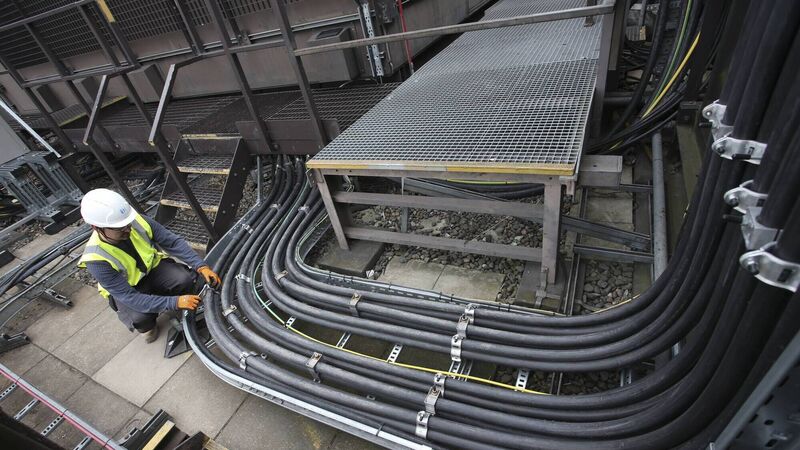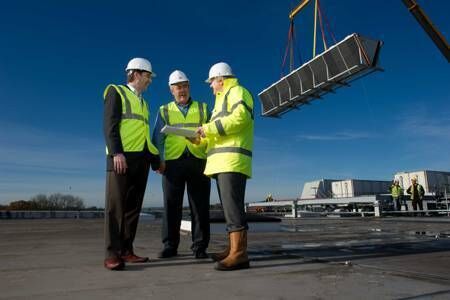Ten Minutes with Teigh Cunningham, quantity surveyor, Dornan Engineering

Dornan Engineering Ltd is a leader in mechanical, electrical and instrumentation contracting, with projects in Ireland, the UK and mainland Europe.
Teigh Cunningham is enjoying working in a quantity surveying role with Dornan Engineering Ltd in Cork, where his career is really gaining momentum. The company has grown rapidly in recent years, resulting in a constant stream of recruitment and opportunities for personal development and career progress. Here he answers our questions about the skills and knowledge he has gained to date and his aspirations for the future.
I was working part-time with a construction contractor and it quickly became clear that the projects offered many professional challenges, but also opportunities for progression and to work with dynamic teams. I could also see the potential for working overseas which I was very interested in as a young person.
I saw quantity surveying as an ideal path to apply my aptitudes in accounting/finance and law in an environment that is less rigid than traditional industries. Working in a project-based role ensured that no assignment felt the same, and the quantity surveying discipline has many paths to follow within the field. A QS can work in estimating; manage contracts for contractors; develop into project managers; become expert witnesses and adjudicators; or represent large clients as their cost managers / agents.
Dornan has grown rapidly in the last 5 years. That has driven a lot of hiring and internal development initiatives to adapt to the size of the business Dornan has become today. I could see the diversity in the hiring, and the calibre of professionals that were joining from major international companies.
Between my first assignment with Dornan and my current role, the company has radically changed.
Dornan teams are dynamic, and individuals are allowed a lot of autonomy where you can receive as much responsibility as you’re willing to take on. The project culture is extremely professional, but the teams are great to work and live with on international assignments.
Dornan is a great place to work where you can be part of a large organization with leadership that take a personal approach to managing the business and interact with the staff at all levels.

I’m currently working on an electrical procurement & construction subcontract for a hyperscale (60 MW) data centre in Europe.
The electrical fit-out is fast-paced, the procurement is highly technical, and we have to manage a wide supply chain of specialists and subcontractors to achieve the plan.
I am also involved in several internal initiatives that aim to enhance the project control processes and tools for Dornan’s project teams. Dornan is working intensely on being prepared for the size and complexity of projects to come as its clients seek long-term partnerships with trade contractors such as Dornan and expect increased management responsibility from these contractors.
The best part of the job would have to be when the processes that you’ve planned, and maintained, are working seamlessly to produce the desired data outputs (e.g., cost performance, or productivity data) so that you can effectively report to project leaders allowing decisions to be made on sound performance metrics.
In other words; when you and the team are in control of project performance information, you can play an integral role in the decision-making process of the project leadership when project challenges require strategic actions to be taken.

A moment I am really proud of was when I successfully passed the interview assessment to become a member of the Royal Institute of Chartered Surveyors.
The assessment is a culmination of all your professional experience, and in order to pass you need to demonstrate professional competency in project management & surveying to such a degree that the RICS determines you can competently advise a client in these areas.
It was such a rewarding experience to be assessed by a panel of senior experts in the industry, and to be able to speak confidently on my competencies. My experience with Dornan went a long way in getting me ready for the assessment.
In five years from now, I see that surveyors will spend less time manually preparing cost and planning information, and be able to leverage information out of common data environments (CDEs) whether that is quantities, costs, variations, or productivity. This will remove tedious information management and enable the surveyor to focus on performing a more specialist role in managing commercial risks for the project (and business) - risk in procurement; contracts; and construction management.
“Time is more expensive than money”. Meaning that it is in every party’s best interest to complete the project as soon as possible. A client might deliberate over unanticipated costs, or the price of a change, without appreciating the impact of the time taken to reach a decision. Failure to direct the project and force effective decision making can create knock-on effects and a loss of momentum on a job.
My advice would be to identify professionals that display qualities or competencies that you admire, and to develop working relationships with them. This creates trust and allows you to ask questions without fear and depend on these professionals for advice. When I was able to do this, I outperformed expectations and managed to survive project assignments that I did not feel comfortable with at the outset.
You need to prepare yourself to be adaptable, and not expect information and structure to always be readily available.
Construction projects present unexpected challenges and put stress on team relationships. If you can adapt to these environments, and change your planned approach, when necessary, you can continue to deliver results for the business.
Communication skills and attitude are important too. For the most part, it is far easier to recruit and work with a less-experienced individual who can communicate confidently, as compared to an expert that cannot work well with others.

Communication skills are key and communicating confidently makes all the difference. Construction depends on the flow of information, and the direction of resources. You need to be able to communicate confidently and learn to interact with different personality types to coordinate effectively for the best results.
Planning is also a key skill. “Fail to plan, plan to fail”. Control of projects boils down to a single principle: Planned vs Actual. What is the Plan (budget/schedule/hours)? What is the actual performance (cost/progress/productivity)? You need to be able to capture the performance of works and teams against plans and review that information for what it is highlighting for the project. Based on this data, informed decisions can be made by the right stakeholders. Plan, do, check, act, and repeat. When dealing with multi-million Euro projects with hundreds of resources, this process takes skilled planning to execute properly.
It can be summed up as “Alone, you can go fast, but together you can go further”.
For me it comes down to the realisation that no matter how high your standard of work is, the organisational culture will collectively deliver much better results for the team, projects, and business, than you can alone.
We can look at our own part that we play in the organisational culture, and how we can drive, motivate and develop our peers to perform at their best.
Most people would like to think they want to work in a high-performance environment, but should think about how they will actively contribute to creating one.
As far as commercial management of projects is concerned, I would have to say the most prescient lesson remains “Records, records, records”.
You can keep an eye on the RICS publications. The RICS publishes a Construction Journal every couple of weeks. The Journal covers topical issues in the industry with good insight from technical experts, and these professionals can then be found on LinkedIn to follow for their posts. Andy Davis runs interesting coverage on the global data center market in his series called the Inside Data Centre Podcast.
The Harvard Business Review and McKinsey publish the most interesting articles on organisational culture, and professional practices that can break the occasional analysis-paralysis around inter-personal and managerial dilemmas at work.
Crucial Conversations: Tools for Talking When Stakes Are High. Again, an emphasis on communication, but the best commercial and contract specialists are the ones that can communicate effectively in high-stakes scenarios with clients, stakeholders, arbitrators, and peers.
The best resources I could recommend would be the RICS “Black Book” section which is a collection of guidance notes that define good technical practice for quantity surveying and construction professionals. The notes are written by leading experts, and always break down the content into three levels: Knowledge, Practical Application, and Advising.









